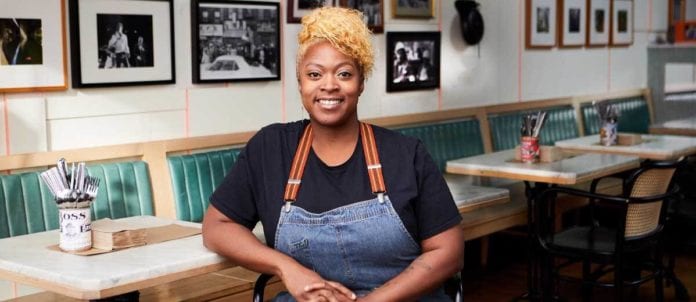Beyond being a celebrated chef, running two popular Toronto restaurants and appearing as resident chef on the Food Network Canada’s Wall of Chefs, Suzanne Barr has set herself apart as an advocate for marginalized people, as well as a healthier, more equitable foodservice industry and food system. And, it’s these community-focused efforts that she ascribes the most value to when taking stock of her career.
When asked about her greatest achievements, Barr proudly lists “Becoming a mother, wife, mentor and an ally with incredible organizations such as Food Share Toronto, SheEO, Chef Manifesto, The City of Toronto and the global movement.” Over the years, she also worked at Toronto’s Gladstone Hotel and Prince Edward County’s Sand and Pearl Oyster Bar.
And, those accomplishments are only fitting when you consider what drew her to begin her food journey.
When Barr’s mother was diagnosed with pancreatic cancer, Barr returned home to Plantation, Fla. to help care for her. “The hardest part of that experience was the fact I didn’t know how to cook for her,” she explains. “She had spent so much of her life in the kitchen, lovingly preparing food for me, my siblings and my father, and I didn’t even know where to begin.” And, this experience marked the start of her journey to become a chef — ultimately spurring her to leave behind a career in film and TV and study at the Natural Gourmet Institute for Health and Culinary Arts in New York.
While Barr may be a relative latecomer to the culinary field, her passion for social justice was sparked much earlier. She points to the Women’s March on Washington and the Million Woman March as memories that shaped her and informed her voice. “I remember very clearly,…in my 20s, finding my voice as an advocate and knowing my future would drive me to stand up and call out injustices,” she says. “Believing in social justice, creating safe spaces, mentorship and championing food systems for racialized people allowed me [to take on certain] roles.”
Reflecting this drive, her businesses have been designed to do more than feed people.
When Barr and her partners opened True True Diner on King Street East in Toronto in the fall of 2019, the venture offered her signature brand of “Afro-Caribbean, soulful comfort food” in addition to serving as a hub inspired by the civil rights sit-ins that took place in diners across North America. The restaurant was envisioned as a safe space to promote support and visibility, but also an opportunity to address and correct inherent flaws in the existing hospitality model.
“In the early stages of planning True True, I remember sitting with my partner (in life and business) Johnnie Karas and manager Stacey Brooks and envisioning a way to focus on our hiring practices in support of finding individuals that would [be of] benefit to our business model,” she shares. “We focused on ‘cross training’ employees — hiring staff to be servers, hosts, cooks, dishwashers and bartenders, rather than everyone doing the same job every shift. We also planned to pool all the tips, allowing for equal-opportunity tip out for back of house and front of house. We additionally created safe workplaces and invited Dandelion Initiative to train our staff on Safer Bars and Safer Spaces training.”
Dandelion Initiative is a Toronto-based grassroots organization for gender-based violence prevention and survivor supports. Its mission is to disseminate survivor-centred gender-based violence education, training and policy development to workplaces in Ontario.
As the larger industry embarks on a journey to root out systemic inequality, Barr says the first step is to acknowledge the system is broken. “The continued toxic elements that dwell in the industry are lack of support for mental health, unjust work spaces, sexism, systemic biases and prejudices, labour infractions and limited renters’ rights,” she explains. “The culture is global and making leaps and bounds to adjust our own commitment to re-building and re-imaging the industry is where work begins now.”
She points to “the removal of archaic principles,” including traditional job description and tipping, and addressing the need for health benefits and “real support for mental wellness” as key steps in dismantling the divisions currently present in the industry. Further, she highlights the need to “set a standard across all hospitality work spaces that respects and honours fair, just practices, offering the opportunity for you to perform your job with dignity and be compensated respectfully.”
And, while the hospitality industry has been making efforts to address its flaws, COVID-19 and the ongoing Black Lives Matter protests have only served to re-double this need by exacerbating and highlighting the impact of existing systemic barriers faced by Black, Indigenous and People of Colour (BIPOC).
The pandemic has resulted in a series of new challenges for Barr. True True, which temporarily closed in March, has since permanently closed. Barr announced its closure in July, stating that, despite hope of re-opening, the decision was made by a business partner.
“Unbeknownst to me, True True Diner never had a fighting chance. I’m not just speaking to my business. I’m calling out the injustices that continue to plague Black and Indigenous-owned-and-operated businesses,” she said in the announcement.
In the original closure announcement, Barr noted the story behind what happened and who was involved is still a private matter. “During the pandemic struggles, our white-privileged partners got a big slice of that hand-out pie and didn’t even think to offer us a bite,” she said in the statement. “We tried so hard to keep this business going with pitched plans of innovative and meaningful pivots. We were turned down at every opportunity by our partners.”
“The issues we battled within True True were, to be honest, rooted in [a lack of] transparency from our partners, white fragility and white supremacy,” she explains.
Despite this recent setback, Barr is moving forward and working on new projects.
“[Perseverance] is a part of how I maneuver in my life and share within my community,” she says. “I learned early in my life that as Black, Indigenous and other racialized people: it’s a part of our how we move throughout our lives, [delving] into spaces of cultural identity, class, race and the awareness of our mental wellness.”
Among these projects is Barr’s first cookbook, Homecoming — “a memoir of my life as a chef,” she explains. “Additionally, I’m working with many organizations and leaders as we maneuver within these waters and re-define the hospitality industry and the right to eat, tackling racism and inequalities in the food systems.”
And, that’s not all. She also has her first food product line in the works, which will focus on comfort and cultural foods. “We’ll celebrate the roles and paths created by the wide [range of] culturally diverse chefs and cooks,” she explains, noting it will facilitate storytelling and the creation of food memories for “folks who grew up eating traditional foods from the Caribbean.”
“I’m additionally continuing to embody the work and efforts of advocating for those whose voices aren’t always heard and creating spaces and opportunities for the many next generations within the food industry,” she adds.


















